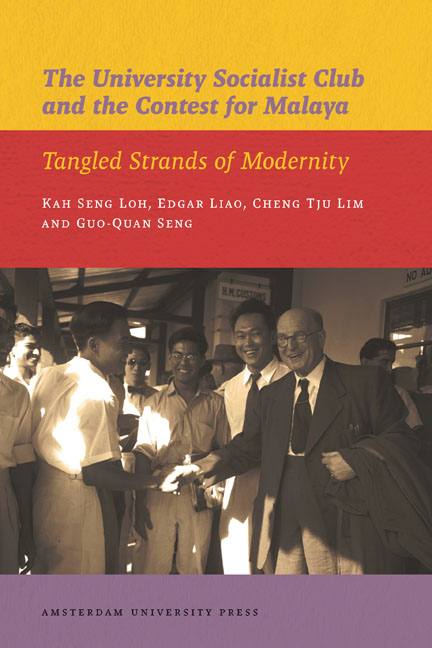Book contents
- Frontmatter
- Dedication
- Contents
- Acknowledgments
- List of Photographs
- Abbreviations
- 1 The Socialist Club and the Modernity Project
- 2 Awake in the Bowl of Night
- 3 The Fajar Trial
- 4 Visionary of the Nation, Voice of Stifled Malayans
- 5 A Beacon of Light on the Campus and Beyond
- 6 Frankly Partisan in the Struggle for Student Leadership
- 7 The Shadow over the Club
- 8 Resisting Malaysia, Swansong for Malaya
- 9 Long Night after Coldstore
- 10 In Defence of University Autonomy and Student Rights
- 11 Entwined Memories and Myths
- Conclusion: Modernity in Singapore and Malaya Reconsidered
- The University Socialists: Biographical Sketches
- Timeline of Events
- Notes
- Bibliography
- Index
- Publications Series
1 - The Socialist Club and the Modernity Project
Published online by Cambridge University Press: 21 January 2021
- Frontmatter
- Dedication
- Contents
- Acknowledgments
- List of Photographs
- Abbreviations
- 1 The Socialist Club and the Modernity Project
- 2 Awake in the Bowl of Night
- 3 The Fajar Trial
- 4 Visionary of the Nation, Voice of Stifled Malayans
- 5 A Beacon of Light on the Campus and Beyond
- 6 Frankly Partisan in the Struggle for Student Leadership
- 7 The Shadow over the Club
- 8 Resisting Malaysia, Swansong for Malaya
- 9 Long Night after Coldstore
- 10 In Defence of University Autonomy and Student Rights
- 11 Entwined Memories and Myths
- Conclusion: Modernity in Singapore and Malaya Reconsidered
- The University Socialists: Biographical Sketches
- Timeline of Events
- Notes
- Bibliography
- Index
- Publications Series
Summary
The making of modern post-colonial Singapore, according to Men in White, a book on the history of the People's Action Party (PAP) published in 2009, began at Cromwell Road in London in 1948, when a trio of students formed the Malayan Forum with the aim of creating an independent, socialist Malaya, including Singapore. They were Goh Keng Swee, Maurice Baker and Abdul Razak Hussein. Lee Kuan Yew, then at Cambridge University, kept in touch with them. These students, we are told, were exceptional among the English-educated students, who were concerned only with “girls, movies and sports”. Yet, in the next act of the narrative, the four were in Goh's home in Singapore, speaking to Sydney Woodhull, a student at the University of Malaya in Singapore, about how they could “help Fajar”. Fajar, meaning “dawn” in Malay, was the organ of the University of Malaya Socialist Club, of which Woodhull was the Publications Secretary. The Club, like the Malayan Forum, pursued a socialist vision of Malaya, including Singapore. Lee subscribed to the journal and was the Club's legal adviser. This “liaison”, the book tells us, invigorated the anti-colonial movement and more pertinently, Lee's political career: when the British colonial government arrested eight editorial committee members of Fajar, including Woodhull, for publishing an allegedly seditious article in May 1954, it was Lee who recruited the Queen's Counsel D.N. Pritt for their defence and became “a hero of high-minded English-educated intellectuals” when the students were acquitted. With his anti-colonial credentials strengthened, Lee subsequently made contact with the Chinese-educated political activists and founded the PAP in November that year.
Standing in contrast to Men in White is The Fajar Generation, which appeared a few months later in both English and Mandarin. The editors Poh Soo Kai, Tan Jing Quee and Koh Kay Yew, all one-time members of the Socialist Club, had compiled a collection of narratives and essays written by former Club members. The University Socialists, as Club members sometimes called themselves, were English-educated intellectuals who chose to participate in the political struggle ahead of a privileged path to a successful career, as most of their peers allegedly did.
- Type
- Chapter
- Information
- The University Socialist Club and the Contest for MalayaTangled Strands of Modernity, pp. 19 - 40Publisher: Amsterdam University PressPrint publication year: 2012

